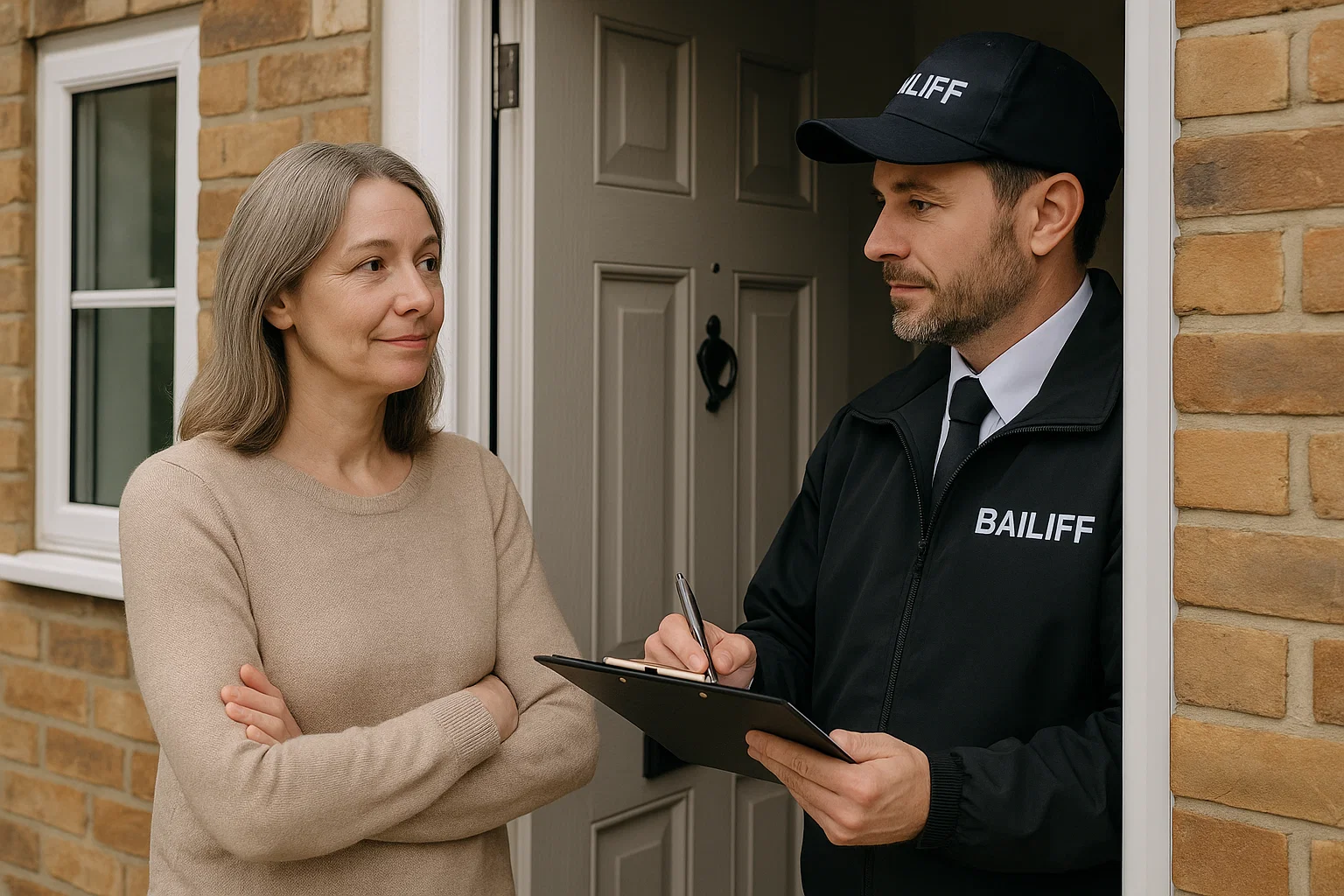No one wants to think about bailiffs showing up unannounced, but when you owe money and feel like you’re running out of options, it’s a real concern. One question we hear often is whether a debt management plan can help avoid this kind of pressure. The answer is yes it can sometimes, but the full picture depends on where you are in the debt process.
If enforcement agents are already involved, or if you’ve had court action taken against you, the situation becomes more serious. Even so, there are still ways to take back control, often without things escalating further.

What Bailiffs Are Actually Allowed to Do
First off, let’s clear something up. Bailiffs (more formally known as enforcement agents) aren’t the same as debt collectors. They have legal authority to recover specific types of unpaid debts. These might include council tax, court fines, parking penalties, or money owed through a county court judgment.
Enforcement agents might work for private companies, your local authority, or directly with the county court. There are different types, such as county court bailiffs, High Court Enforcement Officers and even family court bailiffs. Each has slightly different powers depending on the type of debt they’re chasing.
Before they visit, they must send a notice of enforcement. This gives you at least seven days’ warning so you can try and make a repayment arrangement. If that doesn’t happen, they may arrive at your home and attempt to recover the debt or draw up a Controlled Goods Agreement, which allows them to list items for possible seizure later on.
Contrary to popular belief, bailiffs can’t just force their way into your property. They can’t enter through windows, use ladders, or break down your door for most unsecured debts. You don’t even have to let them in. You can speak to them through the door or letterbox and ask for proof of their identity, such as their enforcement agent certificate.
How a Debt Management Plan Might Help
A debt management plan (DMP) is one of the more flexible debt solutions available. It’s an informal agreement where you repay your debts at a more manageable rate, often over a longer period. Rather than juggling several payments each month, you make one monthly payment that’s then split between your creditors.
It’s not a magic fix, but it can be a powerful way to get breathing space. Creditors often appreciate that you’re making a genuine effort to pay what you owe, even if it’s less than originally agreed. They may pause interest, freeze charges, or hold off on taking further enforcement action, especially if a trusted debt adviser is involved in setting up your plan.
While not legally binding like an IVA, a well-managed DMP can be enough to reassure creditors that they don’t need to pursue bailiff visits or legal proceedings.

Timing Is Everything
If you’ve already been served a county court judgment, a DMP might not stop enforcement agents if they’ve already been instructed. That said, there’s still time to act. Many creditors are willing to withdraw bailiffs if a new payment arrangement is in place and payments start arriving on time.
The best outcome happens when you seek help before things escalate. The earlier you set up a DMP, the better your chances of avoiding court altogether. If enforcement has already begun, getting help quickly can still lead to a more manageable solution.
Will Creditors Still Contact You During a DMP?
Since a debt management plan is not a legally binding agreement, your creditors aren’t forced to stop contacting you. In some cases, they might still send statements or reminders. If they’ve accepted your reduced payment offer and you’re sticking to it, most lenders will ease off.
Occasionally, contact may continue due to administrative errors. If that happens, your debt management company can speak to them on your behalf and sort it out. While it’s not uncommon to receive the odd letter, constant calls or pressure should be reported to your adviser immediately.

Can a Bailiff Still Visit If You’re Already in a DMP?
Technically yes, particularly if the DMP was arranged after legal action had already been taken. Some creditors, especially when chasing county court debts, may proceed with bailiff visits even if you’ve entered a plan.
That said, many creditors prefer to avoid the costs of using a certificated enforcement agent. If you’re showing good faith through monthly payments, they may cancel enforcement altogether. In other cases, they may still allow the bailiff to visit once but accept your DMP as a sign that you’re cooperating.
The important thing is to act fast. If you’ve received a notice of enforcement, don’t wait until they turn up at your door. Speak with a qualified adviser and see if a DMP or another solution can be put in place before things go further.
What If You Can’t Afford the Payments?
Even with the best intentions, your income might change, expenses might rise, or a crisis might throw everything off track. If you can’t keep up with your DMP, the worst thing to do is ignore it.
Talk to your debt adviser as soon as you spot a problem. You might be able to revise the plan or consider other options like an IVA, which can offer more protection and write off unaffordable debts after a set term. Your adviser might also help you look at options like a debt relief order, lump sum settlement, or a different way to manage your financial situation.
In short, don’t suffer in silence. DMPs are designed to be flexible, but they only work if you stay in regular communication with your provider.

What About the Bailiff Fees?
If a bailiff does visit your home, you’ll be charged bailiff fees in addition to the debt. These can start from around £75 for the initial letter and rise quickly if they visit or remove items.
Setting up a DMP before enforcement action gets this far can help avoid these extra charges. It’s another reason why seeking advice early is so important. No one should be paying more than they need to when there’s already enough pressure on their finances.
Will a DMP Affect My Credit?
Yes, but perhaps not as much as you fear. Since a debt management plan involves paying less than originally agreed, it will show on your credit file. Your credit rating may be affected for the length of the plan and beyond, especially if you miss payments.
That said, if you’re already missing payments or defaulting, a DMP might actually help stabilise things. Over time, making consistent monthly payments under the plan shows that you’re taking responsibility and trying to improve your financial health.
It’s worth remembering that enforcement action, such as county court judgments, can also damage your credit. In many cases, a DMP is the better alternative.

How to Find the Right Help
Not all debt management companies are created equal. Look for a service that provides impartial debt advice and explains all your options. Some organisations charge upfront fees, while others are free. Be sure to understand the full terms before agreeing.
The best providers will look at your income, debts, bank accounts and essential spending to determine what you can afford. They’ll also help you prioritise the most urgent bills, like mortgage payments or income tax, before setting up a plan for your unsecured debts.
Whatever you choose, you should never feel pressured. A good adviser will give you the information, support and space you need to make the right decision.
It’s Never Too Early to Take Control
If you’re worried about bailiff visits, struggling with regular payments, or feeling overwhelmed by the thought of falling behind again, a debt management plan might be the lifeline you need.
It won’t fix everything overnight, and it won’t stop every enforcement threat, but it can buy you time, reduce the stress and help you build a route out of debt without losing all the money to extra charges.
Want to see if it’s right for you? Get in touch with My Debt Plan today for a confidential chat and explore all the options that could help you move forward, no matter how serious things feel right now.






